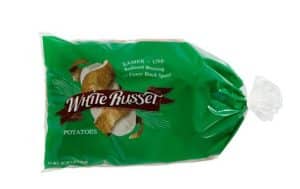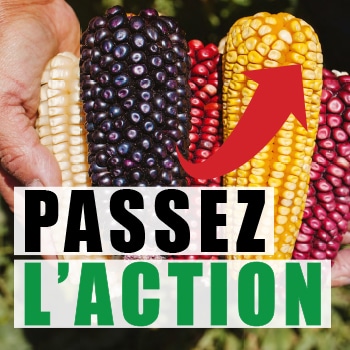Potato
Market Status
December 2023: GM potatoes are not sold in Canada at this time, but are grown and sold in the US. There are no GM potatoes on the market in Canada. A small amount of GM potatoes from the company Simplot are grown in Canada, for research purposes and for shipping to the US.
Simplot’s GM non-browning potatoes were approved in Canada in March 2016, with further varieties approved in 2017. The potatoes have various combinations of four GM traits: reduced levels of sugars and asparagine, reduced bruising, and resistance to late blight. The company Simplot said they have only put the GM potato on hold in Canada until the market is ready.
- The GM potato is grown and sold in the US.

- In 2001, Monsanto took its approved GM insect-resistant potato off the market in Canada and the US.
75% of Canadians said they would not eat a GM potato even though it is approved as safe by Health Canada, according to a poll from Leger Marketing, commissioned by Vigilance OGM, September 2020.
Take Action
The company Simplot that developed the GM potato said (2017), “When there’s a market we’ll be there.”
“This really just comes down to Canadian retailers and food service providers – once they demonstrate interest, we have plenty of growers lined up that would like to grow for us.” – Doug Cole, Director of Marketing and Biotech Affairs at J.R. Simplot Company, seller of GM seed potatoes, 2019.
Will this GM potato make it to market?
- Write to the head office of your grocery store and ask them to pledge not to sell GM vegetables and fruits.
- Ask McDonalds 1-888-424-4622
- Ask McCain (Frozen French Fries) contactus@mccain.com
“Since 1999 McCain Foods has abided by a policy of not using genetically modified potatoes in any of our products globally This policy holds true today…” – McCain Foods, 2020.
Past Developments
2021: The Peruvian Congress has enacted a moratorium law prohibiting the entry and production of genetically modified organisms within its borders for the next 15 years. Peru is the global centre of origin of the potato and holds the greatest diversity of potato varieties, largely conserved by Indigenous farmers. Following an extensive campaign that mobilized farmers, citizens and more than 30 organizations under the banner “Biodiversity is our Identity: United for a GMO-free Peru”, the country renewed its ban until December 2035.
Simplot’s “Innate” GM Potatoes Approved in Canada – 2016/2017: The Canadian government has approved varieties of genetically modified (GM) potato called “Innate,” from the U.S. company Simplot. In Canada, the potatoes are genetically engineered with multiple traits including to resist bruising, late blight resistance, have reduced sugar levels, and have reduced asparagine to reduce acrylamide from frying (asparagine is an amino acid in potato that reacts with some sugars to oxidize into acrylamide which is a possible carcinogen, at around 120F (49C), especially during high-temperature frying). The first of these GM potatoes was approved in the U.S. in November 2014.
January 2014: Europe’s second-highest court on Friday overturned a decision by the European Commission to allow the cultivation and sale of a genetically modified potato developed by German chemicals group BASF. The General Court of the European Union said the Commission had failed to follow the bloc’s rules when approving the Amflora potato, which was genetically modified to produce extra starch for use in the paper industry. The Commission first proposed the cultivation and sale of Amflora in 2007, following a positive scientific assessment by the European Food Safety Authority (EFSA). Following the failure of EU government ministers and officials to approve or reject the proposal, the Commission exercised its power to grant approval unilaterally in 2010.
January 2013: Indigenous peoples in the Peruvian Andes are outraged at the announcement of the “release” of a Genetically Modified Potato by researchers at a public university in central Peru; this in spite of a 2012 law and regulations by the Peruvian Government which establish a 10 year GMO moratorium in Peru.
January 2013: BASF, the largest chemical company in the world, will no longer seek European approval of its genetically modified potatoes (for starch production) because of stiff (hehe – starch pun) resistance: “continued investment cannot be justified due to uncertainty in the regulatory environment and threats [over the destruction of crops].”
July 2012: Ireland’s Environmental Protection Agency has given consent to the Department of Agriculture’s research arm, Teagasc, to carry out field trials on a genetically modified potato that could improve resistance to blight. The trial is to be carried out over the next four years, at Oak Park in Co Carlow, on an area up to two hectares.
January 2012: BASF announced that it is moving its GMOs out of Europe. It is moving its headquarters from Germany to the US. In 2010, BASF received European Union permission for cultivation of its GM potato called Amflora, to be used for industrial starch production, not food. However in 2011, BASF said it planned to cultivate just two hectares of the GM potato in Germany and 15 hectares in Sweden. Analysis from Ignacio Chapela: “Clearly put: one of the largest among the few who banked on the GMO route to do agriculture is giving up in its own home turf, defeated by public opposition to its products which evidently do not live up to expectations.” The world is squeezing GM back to North America, where resistance is strong and growing.
March 2010: German chemical giant BASF has won approval from the European Commission for commercial growing of a GM starchy potato for production into potato starch for industrial use. Once the starch has been removed, the skins can also be fed to livestock. Farms in Germany, Sweden, the Netherlands and the Czech Republic may plant the potato. BASF fought a 13-year battle to win approval for the GM potato called “Amflora”. “Not only are we against this decision, but we want to underscore that we will not allow the questioning of member states’ sovereignty on this matter,” said Italy’s Agriculture Minister, Luca Zaia. Austria said it would ban cultivation of the potato within its borders, while France said it would ask an expert panel for further research.
Peru, the world’s potato centre of diversity bans GE: In June 2010, the Peruvian Congress announced a ten year moratorium on the cultivation of GE crops. In 2007, the Cusco region in Peru declared a ban on the growing, sale, use and transport of genetically engineered potatoes in recognition of the historical, cultural, social and economic importance of the potato to the region. The Andean region, which includes Peru, is the center of origin for the potato.
Victory for the Potato in South Africa! October 2009: South Africa’s GM body, the Executive Council (EC), has rejected attempts by the Agriculture Research Council (ARC) to bring GM potatoes onto the market. The EC cited no less than 11 biosafety and socioeconomic and agronomic concerns for rejecting ARC’s commercial release application. Its five year field trial programme has chewed up considerable public funds as well as having been bankrolled by USAID and Michigan State University. Click here to read the letter from CBAN to the South African government, sharing Canada’s experience Aug 29, 2008
Monsanto withdrew its GE Potatoes in North America 2001: Monsanto’s genetically engineered insect resistant (Bt) potatoes were approved in Canada back in 1996 but consumers rejected them and they are no longer sold anywhere in the world. Click here for the full story of what happened to Monsanto’s potatoes in Canada.






